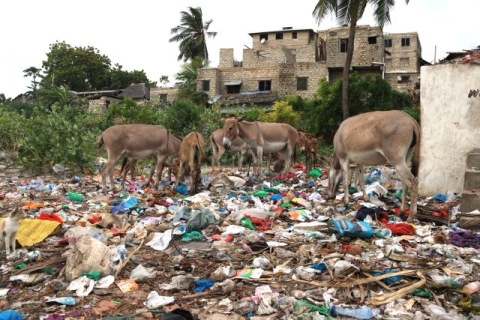

The Donkey Sanctuary Kenya sees rise in cases of poisoning and colic due to plastic ingestion
9 July 2024
3 minutes
The lead vet at The Donkey Sanctuary’s clinic on Lamu Island in Kenya has issued a stark warning about the increasing number of donkeys who are dying as a result of escalating plastic pollution at the UNESCO World Heritage site.
Up to five per cent of donkeys presenting at the international animal welfare charity’s clinic show signs of nutritional colic, which is usually fatal. Prompted by the alarm raised by clinic staff and the shocking discovery of 35kg of plastic waste in a cow’s stomach at an abattoir on Lamu, scientists from the University of Portsmouth and The Donkey Sanctuary are investigating the effects of plastic pollution on donkeys and livestock in Kenya.
At the dumpsites the donkeys will eat all sorts of things, from plastics to clothes to cartons – everything. This brings a lot of issues for donkeys’ health – with the majority of the donkeys suffering from colic, as a result of foraging at the dumpsites. Nutritional colic in donkeys is usually fatal. But we also lose donkeys to poisoning, for example, from residual rat poison, which can find its way to the dumpsites after domestic use.
Dr Obadiah Sing'Oei, Lamu Programme Manager and Clinic Lead at The Donkey Sanctuary’s clinic in Lamu
While the devastation caused to marine wildlife by plastic pollution is widely known, this study is one of the first of its kind to look at its impact on terrestrial ecosystems too.
The team began by analysing the foraging behaviours of donkeys and cattle in Lamu and levels of plastic ingested to fully understand the scale of the problem.
On Lamu, people rely heavily on donkeys and livestock. However, with little grass or edible vegetation available, many animals are left to forage for food at waste sites and ingest plastic packaging and other waste materials alongside food residues. Early results suggest donkeys are at greater risk of death from plastic ingestion than cattle due to their biology and behaviour.
Dr Obadiah Sing'Oei, Lamu Programme Manager and Clinic Lead at The Donkey Sanctuary’s clinic in Lamu said: “At the dumpsites the donkeys will eat all sorts of things, from plastics to clothes to cartons – everything.
“This brings a lot of issues for donkeys’ health – with the majority of the donkeys suffering from colic, as a result of foraging at the dumpsites. Nutritional colic in donkeys is usually fatal. But we also lose donkeys to poisoning, for example, from residual rat poison, which can find its way to the dumpsites after domestic use.
“We are pleased that, with the help of researchers from Portsmouth, we will be able to highlight and address what is fast becoming a crisis for donkey welfare.”
In many countries, including Kenya, domestic animals graze open waste dumps to find food, consuming plastics that can have a dire effect on health and welfare. Even if livestock appear unharmed, meat and milk often contain microplastics that in turn can affect human health. The problem of plastic pollution is getting worse, and we need to know how this impacts the animals that play such a major role in these communities.
Dr Leanne Proops, Associate Professor in Animal Behaviour and Welfare, and member of the Revolution Plastics Institute at the University of Portsmouth,
Dr Leanne Proops, Associate Professor in Animal Behaviour and Welfare, and member of the Revolution Plastics Institute at the University of Portsmouth, said: In many countries, including Kenya, domestic animals graze open waste dumps to find food, consuming plastics that can have a dire effect on health and welfare. Even if livestock appear unharmed, meat and milk often contain microplastics that in turn can affect human health. The problem of plastic pollution is getting worse, and we need to know how this impacts the animals that play such a major role in these communities.”
Dr Emily Haddy, Postdoctoral Research Fellow at the University of Portsmouth recently visited Lamu to lead community focus groups with local livestock owners, vets and residents to understand the challenges and concerns regarding donkey welfare.
She said: “From previous discussions with the community, we know there is growing concern about the links between plastic pollution, ecosystem health, animal welfare and human wellbeing. However, the picture is complex, livestock owners often cannot afford to feed their animals and through necessity let their animals loose to graze. The community focus groups have helped us understand more about how these complex issues affect the people and animals involved.”
From previous discussions with the community, we know there is growing concern about the links between plastic pollution, ecosystem health, animal welfare and human wellbeing. However, the picture is complex, livestock owners often cannot afford to feed their animals and through necessity let their animals loose to graze. The community focus groups have helped us understand more about how these complex issues affect the people and animals involved.
Dr Emily Haddy, Postdoctoral Research Fellow at the University of Portsmouth
Initial findings to be published later in the year, have highlighted a pressing problem. The University of Portsmouth will continue to collaborate with The Donkey Sanctuary in Lamu who are supporting local communities and partners to reduce plastic pollution.
